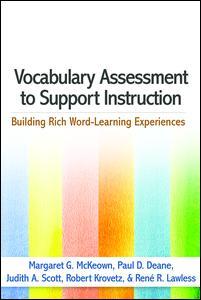Description
Vocabulary Assessment to Support Instruction
Building Rich Word-Learning Experiences
Authors: McKeown Margaret G., Deane Paul D., Scott Judith A., Krovetz Robert, Lawless Rene R.
Language: English
Subjects for Vocabulary Assessment to Support Instruction:
37.68 €
In Print (Delivery period: 15 days).
Add to cartPublication date: 08-2017
· 15.2x22.9 cm · Paperback
56.31 €
In Print (Delivery period: 15 days).
Add to cartPublication date: 07-2017
· 15.2x22.9 cm · Hardback
Description
/li>Contents
/li>Readership
/li>Biography
/li>
Vocabulary development is essential for learning, but conventional vocabulary assessments lack the range and flexibility to support K-12 classroom teachers in making instructional decisions. Drawing on linguistics, educational psychology, and educational measurement, this book offers a fresh perspective on word learning and describes powerful, precise assessment strategies. Guidelines are presented for selecting which words to teach, evaluating the depth and richness of students' word knowledge and their ability to apply it in complex contexts, designing effective instructional practices, and using technology to create adaptive and scalable assessments. User-friendly features include sample test items, classroom examples, a glossary, and suggested print and online resources.
1. The Importance of Teaching and Assessing Vocabulary
2. A New Perspective for Thinking about Vocabulary
3. Surveying the State of Vocabulary Assessment
4. Which Words and Word Meanings Should We Teach and Assess?
5. How Should We Assess Vocabulary?
6. Classroom Practices for Vocabulary Instruction
7. The Role of Technology to Support Adaptive, Flexible, and Scalable Assessments
Appendix 7.1: Some Important Corpora
8. Resources for Developing a Nation of Word Learners
Glossary
References
Index
Margaret G. McKeown, PhD, is Clinical Professor of Education in the School of Education and a Senior Scientist at the Learning Research and Development Center at the University of Pittsburgh. Her work addresses practical, current problems that classroom teachers and their students face. Dr. McKeown has conducted research in the areas of instructional design and teacher professional development in reading comprehension and vocabulary. She is a recipient of the Outstanding Dissertation of the Year Award from the International Literacy Association and a National Academy of Education Spencer Fellowship. Prior to her career in research, Dr. McKeown taught reading and language arts in elementary school. She is coauthor of books including Bringing Words to Life, Second Edition, and Creating Robust Vocabulary.
Paul D. Deane, PhD, is a Principal Research Scientist in Research and Development at Educational Testing Service (ETS). He has published extensively on lexical semantics, vocabulary assessment, writing assessment, and principles of assessment design. His research on vocabulary assessment has focused on developing methods to measure different aspects of vocabulary depth and breadth. During his career at ETS, Dr. Deane has also played a key role in the Cognitively Based Assessments of, for, and as Learning (CBAL) research initiative, where he led the development of learning progressions and assessment designs for English language arts, including vocabulary assessment.
Judith A. Scott, PhD, is Associate Professor in the Department of Education at the University of California, Santa Cruz. Her work addresses vocabulary acquisition and blending vocabulary instruction with effective teacher education within the context of language, literacy, and culture. Dr. Scott has been the lead researcher on three federally funded vocabulary research projects, including one focused on innovation in vocabulary assessment. She is a recipient of the John C.




